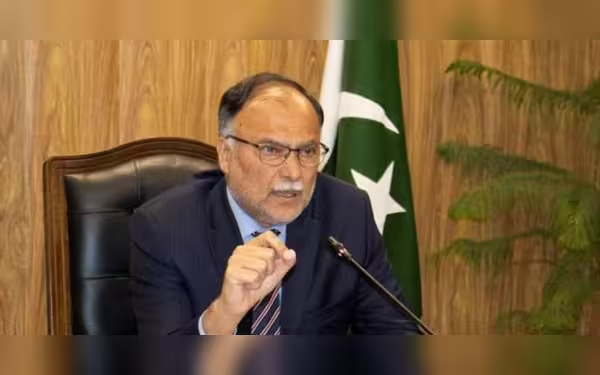Saturday, November 16, 2024 05:38 PM
Ahsan Iqbal Commends Government Efforts to Reduce Inflation in Pakistan
- Inflation rate drops to 6.9%, lowest in 44 months.
- Food inflation decreases significantly, urban at 1.7%.
- Government urged to address price disparities and transport costs.
 Image Credits: urdupoint
Image Credits: urdupointAhsan Iqbal praises government efforts as inflation drops to 6.9%, urging action on price disparities and transport costs.
In recent months, the issue of inflation has been a pressing concern for many citizens in Pakistan. Inflation, which refers to the general increase in prices and fall in the purchasing value of money, can significantly impact the daily lives of people. However, recent reports indicate a positive trend as the government has made strides in reducing inflation rates. This development is particularly noteworthy as it comes after a period of high inflation that reached alarming levels.
On Tuesday, Federal Minister for Planning, Development and Special Initiatives, Professor Ahsan Iqbal, praised the efforts of various government entities in their fight against inflation. According to a press release from the planning division, the inflation rate has seen a remarkable decline, reaching its lowest level in 44 months at just 6.9% in September 2024. This is a significant drop from the staggering 31.4% recorded in September 2023.
During a meeting of the National Price Monitoring Committee, Iqbal highlighted the impressive reduction in food inflation. Urban food inflation decreased dramatically from 33.9% to just 1.7% over the past year, while rural food inflation even dipped into negative territory at -0.9%, down from 35.4% in the same month last year. Such figures indicate a positive shift in the economic landscape, providing hope for consumers who have been struggling with rising prices.
Furthermore, the minister noted that essential commodities such as wheat flour and petrol (super) have seen significant price reductions, with wheat flour prices dropping by 37.1% and petrol prices by 20% compared to the same month last year. These decreases are crucial as they directly affect the cost of living for ordinary citizens.
However, the meeting also revealed some challenges that remain. Representatives from the Pakistan Bureau of Statistics (PBS) presented data showing disparities between the prices of food items in the open market and those reported in official statistics. They pointed out that there are large gaps between wholesale and retail prices for essential commodities across different provinces. This discrepancy raises concerns about the effectiveness of price control measures currently in place.
Moreover, it was noted that the recent decrease in petroleum prices has not been adequately reflected in transport services, which is a matter of concern for the minister. In response, Iqbal directed provincial governments to take immediate action to lower transport, wholesale, and retail prices. He emphasized the government's commitment to providing maximum relief to the common man, ensuring that the benefits of reduced inflation are felt by all.
In a related session, Federal Minister for Petroleum Mussadiq Malik reiterated the government's dedication to alleviating the financial burden on citizens. Both ministers called on provincial governments and the Islamabad Capital Territory (ICT) Administration to enforce price control mechanisms strictly, particularly in minimizing the gap between wholesale and retail prices and reducing transport fares.
While the recent decline in inflation rates is a positive development for Pakistan, it is essential for the government to address the existing challenges in price disparities and transport costs. By taking decisive action, the government can ensure that the benefits of reduced inflation reach every citizen, ultimately contributing to a more stable and prosperous economy. As the situation evolves, it will be crucial for all stakeholders to remain vigilant and proactive in their efforts to maintain this positive trend.













